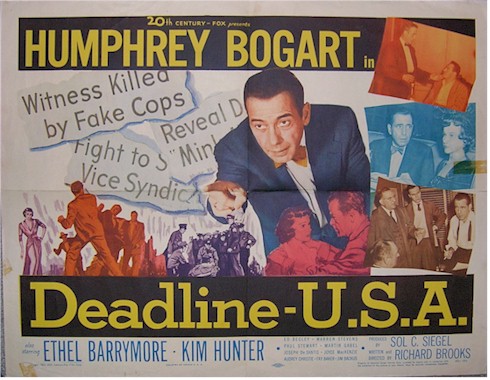 The movie poster gives you the general idea of the plot, but here is the radio version of a classic “heroic newspapermen” movie called Deadline U.S.A. (click to play or download the mp3 if a “player” icon isn’t visible below). You don’t get Bogart, but it’s still a great story.
The movie poster gives you the general idea of the plot, but here is the radio version of a classic “heroic newspapermen” movie called Deadline U.S.A. (click to play or download the mp3 if a “player” icon isn’t visible below). You don’t get Bogart, but it’s still a great story.
This version was broadcast by the anthology series Lux Radio Theater in 1953, a year after the film’s release, and rebroadcast on Armed Forces Radio as Hollywood RadioTheater, minus the soap selling. That is the version offered here, via the old-time radio collection at the Internet Archive (archive.org).
Lux/Hollywood was one of several radio anthology series that regularly produced abbreviated versions of feature film plots.
Humphrey Bogart made a memorable editor — dedicated to the news and to his about-to-be-sold newspaper, even if he did, for some reason, call everybody “baby.” Maybe that was “hip” in 1952?
On radio, Dan Dailey has the editor’s role and does a pretty good job getting out a broadcast edition of the story. His rapidfire delivery is full of anger, fatigue and frustration. (And, in one scene, inebriation — probably hard to do on radio without sounding like a buffoon.) Overall, I miss Bogart’s more subtle portrayal. Maybe in the fall I’ll be able to get students to compare the two.
Like many other “newspaper” tales, “Deadline U.S.A.” has an internal love story and observations about troubled newspaper marriages. In the radio version, one of the strongest scenes is the editor’s conversation with his publisher’s widow about her late husband and the neglected daughters who now plan to sell the paper he founded.
Both on film and on the radio, the paper is in trouble, and the editor delivers solid testimony on the public’s need for civic-minded newspapers, and for competition among then, and he delivers a moving closing speech over the roar of the press.
The radio cast also includes one of radio’s most familiar voices, William Conrad, who popped up in several episodes of “Night Beat,” sometimes as a reporter or editor, and memorably played the city editor in another classic “newspaper movie,” Jack Webb’s day full of deadlines called “–30–.”
For more on “Deadline U.S.A.,” the film, a Google search will provide plenty of testimonials calling it one of the greatest newspaper films, praising Bogart’s performance in the original, and wondering why it has not been released on DVD… along with disgruntled fans’ latest uploads of clips to YouTube.
UPDATE (Nov.2011): Margate Entertainment’s TVS Home Video came out with a DVD release, apparently based on a Fox Movie Channel version. It’s available through Amazon.com (including an online rental) and TV4U.com
Note: I previously combined this item with one about the radio play, “Correction,” which features the dark side of the power of the press, when used irresponsibly. But giving “Deadline U.S.A.” its own page felt like a more positive view of journalism to end the semester, even if its message about the economics of newspapers isn’t the most hopeful. For a more upbeat take on the news media of 2011, I’ve been recommending this speech by Eric Newton of the Knight Foundation.

Thanks to Old Time Radio Researcher Joe Webb for pointing out that Bill Conrad is one of the editors! Page updated.
Nice write-up. I’m a big Bogart fan, and whenever someone asks me to recommend some ‘under the radar’ flicks, I tell them about Deadline USA, Conflict, and All Through the Night.